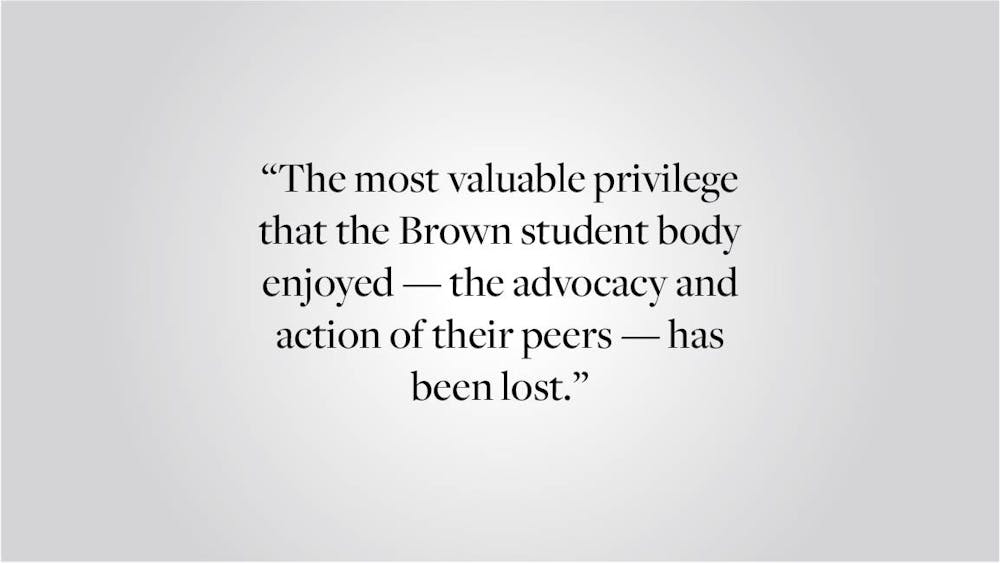After a tumultuous student council election last spring, another article concerning the Undergraduate Council of Students is likely the last thing this campus wants to read. Yet UCS troubles continue to plague the University. This time, in a matter that affects all Brown students, our ability to engage in democracy and our voice in Brown's student government is at stake.
I have been a general body member of UCS since fall 2020 and have been involved in the Equity and Inclusion, Campus Life and Health and Wellness committees through the years. However, recent actions by UCS administration to dissolve the UCS general body in favor of “town halls” have put my standing within the body in question. Even more importantly, the dissolution of the general body impacts how other students can engage in free speech, limiting their access to discussions with invited members of administration and stifling their representation by general body members who advocate on their behalf.
In the spring, the normal UCS elections went to a runoff after a constitutional discrepancy prompted the Student Government Association to prematurely declare winners for several races. The runoff resulted in new winners in two races: president and chair of campus life. These events naturally may have increased the propensity for the student body to distrust UCS, as voiced by several members of the body last semester. The next UCS endeavor this fall should have been aimed at increasing transparency, trust and engagement with the student body.
However, the new UCS administration chose not to prioritize this goal. Instead of developing models of engagement between UCS and the student body to promote democratic values, the new UCS town hall model and revisions to its code of operations instead promote the exact opposite. In my experience, our town halls historically haven’t seen great attendance. But more importantly, picking this model came at the cost of dissolving the UCS general body, the student body’s best tool for advocacy and democracy.
For those unaware, the general body played an important role as an intermediary between the student body, student government and University administration. In previous semesters, general body members proposed and voted on legislation, spoke during meetings and voted in internal elections.
Prospective general body members had to receive 20 signatures from their peers to become voting members of UCS. In my experience, this pushed interested individuals to build a platform around their ideas and ask for buy-in from their peers before they could hold a general body position. I believe it created a representative and engaged system that helped all students have a voice in student government.
UCS administration announced the town hall model in a campus-wide email on Sept. 6 and wrote that they would “open Q&A sessions for the public to voice concerns or ask questions of each of our representatives.” However, in order to present or speak at any of these town halls, groups or individuals must sign up using a Google Form a week in advance. Additionally, in this new model, the opportunity for UCS members to engage in democratic processes is lost because UCS members are no longer enfranchised. In the general body model, members would typically vote on measures; in town halls, that’s no longer the case. The same goes for their historic abilities to spontaneously propose motions and speak on individual matters. Voting power on UCS now belongs exclusively to the executive board, which continues to meet regularly, deliberate and vote on items in closed sessions.
Eliminating general body meetings removes the chance for individuals to voice their dissenting opinions with the agency to make a change. Even important methods of checks and balances, like recall petitions, can no longer be presented by those not on the UCS executive board. The most valuable privilege that the Brown student body enjoyed — the advocacy and action of their peers — has been lost.
Recently, the chair of campus life position became vacant, according to a Sept. 12 email from SGA, necessitating an internal election. Instead of hearing the candidates speak at a general body meeting, the executive board were the sole individuals who spoke with the candidates and subsequently voted on filling that position. The executive board is composed of just 17 people, several of whom are appointed directly by the president and vice president, not elected by the student body. With just 17 individuals voting in this special election, UCS has established a problematic precedent where significantly fewer votes than previously needed can fill positions. Unless changes are made within UCS, future elections, pieces of legislation and resolutions may well be decided by a select group of students on the executive board.
Our pathways to hold student leaders accountable are slim, thanks to the closure of general body meetings and the newly privatized UCS executive board meetings. While I doubt the intention was to stifle democratic input, eliminating platforms for airing differing opinions, legislation and resolutions certainly has negative impacts on accountability. These actions shouldn't be tolerated by the UCS members or the student body.
I'm calling upon the UCS executive board to reopen its meetings to the public and reinstate general body meetings. The Brown student body deserves the opportunity to contribute to and shape its own representation — and the actions I’ve called for would support democratic values paramount to our society. After watching the disastrous spring elections unfold, I will not sit idly by as democracy on our campus is further eroded, and neither should you.
Christopher Vanderpool ’24 can be reached at christopher_vanderpool@brown.edu. Please send responses to this opinion to letters@browndailyherald.com and other op-eds to opinions@browndailyherald.com.





